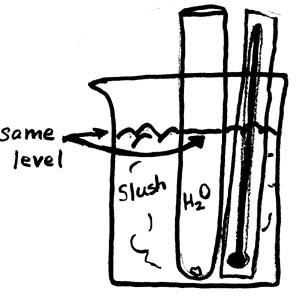

|
Purpose: To determine by what
percentage water expands as it freezes.
Pre-Lab Questions 2. If the enrollment at Helena High School goes from 1650 to 1700, by what percentage did the enrollment increase?
Materials
Procedures 2. Fill the test tube about half way with water from the tap. Place a small course piece of rock (1-5 mm across) into the tube. Hold the tube upright on the table top and use a metric ruler to measure the height of the water in the test tube to the nearest .1 cm. Record this below. Height of water in test tube (measure to nearest .1 cm): ______ cm  3. Obtain a
beaker full of slush from your instructor. The slush contains a supercold mixture of snow (or ice), salt, and water. DO NOT HOLD YOUR FINGERS IN IT FOR MORE THAN A FEW SECONDS. IT MAY BE COLD ENOUGH TO CAUSE FROST BITE! 3. Obtain a
beaker full of slush from your instructor. The slush contains a supercold mixture of snow (or ice), salt, and water. DO NOT HOLD YOUR FINGERS IN IT FOR MORE THAN A FEW SECONDS. IT MAY BE COLD ENOUGH TO CAUSE FROST BITE!4. Place the test tube of water in the middle of the beaker. It is important that the level of water in the test tube be the same as, or slightly below the level of the slush. (see illustration above) Place a thermometer in the slush. 5. Start the stopwatch. Every minute write down the temperature, and check the water in the test tube to see if it has started to freeze. You may slide it out briefly to check. Write the temperature and your observations on your data table. 6. When the water becomes solid, remove the test tube and measure the height of the ice in the tube. Record this height below. Place the tube into the tray of warm water before it cracks. Height of ice in test tube (measure to nearest .1 cm): ______ cm7. Calculate the difference in height between the ice and water. Height of ice - height of water = ______ cmFollow-Up Questions 1. By what percentage did the height of your water change as it froze? ______ % change in height divided by the height of water before freezing5. Would you expect water to expand more if it freezes slowly, . . . or freezes quickly? Hint: Think about the formation of crystals. 6. Water takes up the least amount of space when it is 4 degrees Celsius. Which of the following explains why water expands as it freezes? Circle one. A) crystals form . . . . B) the molecules slow down . . . . C) the molecules speed up7. Which of the above choices explains why water expands as it gets hot? 8. Explain what this lab has to do with the breaking up of rock (weathering). Your text may be helpful here. 9. I frost wedging considered to be a type of chemical weathering, or a type of mechanical weathering? 10. Explain the reason for your answer to question #9. 11. How does mechanical weathering help to speed up chemical weathering?
|
